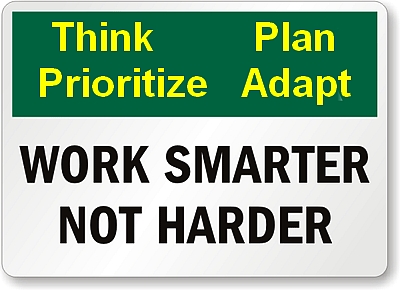Improve Work Prospects by Working Smarter, Avoiding Time Wasters
Everyone does dumb things at times - its simply human nature, but many people do lots of unproductive things at work without thinking about them.
Its time to take control be more assertive and say no the time wasting and unproductive thing people accept as the 'norm' at work.
Working smart means working efficiently and effectively.
Working dumb means doing the things that others do when you know they are time wasters and achieve very little.
This article is about recognising all the dumb things smart people do at work and how to eliminate them.
You can do it!
Work Smarter. Work More Efficiently. Stop doing the dumb things!

Six Stupid Things Smart People Don't Do
Don't Let Emails Rule your Work Life
Many major businesses have eliminated email systems because they recognise that most of them are irrelevant and not effective. Too many emails are sent to everyone. Too many are irrelevant. Too many people feel that they have to respond immediately to any email that arrives in their in-box. Why do people think this? Many people let emails totally ruin their concentration - and some people like to be disturbed because it provides relief from their high priority tasks that they may be struggling with.
Stopemails from controlling and ruining your productivity your life
Only check your emails twice a day, and turn-off the instant posting pop-up messages that informs you when every email is posted. If necessary tell people that you will only be checking emails once a day.Change the way you personally treat emails and only respond to the ones that are directly relevant. Delete yourself from email lists that are not relevant or filter them out.
Stop Wasting time in Poorly Run and Designed Meetings
Really smart people excuse themselves from meetings that are not really relevant. The test is whether you can, or are expected, to make a contribution, or the meeting will affect you in some way. There is no real point in going to a meeting simply for information - simply ask to be sent a copy of the minutes or outcome statement.
Many meetings that you feel obliged to attend are poorly designed and run with unclear agendas, delayed starts, run into overtime and more don't have a hope of achieving anything. Its time to make a stand. At the start of the meetingask that purpose of the meeting be clarified and what are the expected outcomes. Do your best to ensure that themeeting sticks to the agenda and time limit. If the chair of the meeting does not allocate time for each agenda item then it may be up to you to keep the meeting progressing through the items. Make suggestions that bring the meeting to a decision, even if its passed on to another meeting. If most of the meetings are long-winded and achieve little request that the time for meetings be reduced from 60 minutes to 30 minutes. This often does wonders for eliminating the rambling and irrelevant stuff.
Don't Let Work Interfere with your Exercise or Relaxation Program
Forgoing your daily exercise or relaxation period is counter productive - it demonstrates that your planning and organisation have failed. These sessions should be rewards for jobs completed - missing the sessions denies these rewards and work can be come a drudge. These breaks are essential to keep you fresh and engaged. It is remarkable how often when you get away that the solution to a worrying problem suddenly pops into your head. These sessions are also vital for your relationships at work maintaining your persona as a smart, focused, helpful, intelligent, witty person. Don't allow ‘stupid work pressures’ to interfere with your exercise or relaxation schedule. Taking 3 hours a week for exercise represents just 2% of your time - hardly a major loss.
Don't Eat Badly when you feel under Pressure
Everyone has bad days and time when the pressure can built stress and tension. However grabbing a chocolate bar or eating fatty take-away food is not an excuse for eating badly. Why people reach out for the junk when they feel stressed or depressed is unclear - maybe its the reward thing gone bad, maybe its the desired for relief, maybe its rebellion. Whatever the cause we all know it does not work. The sugar fix peaks out and crashes so we feel bad again. Eating fatty food makes you feel boated and lousy. It works for about half an hour and then you feel bad again.Looking after your body and not abusing it works better in the long run. It is a good idea to try something new but make sure its healthy. You’re smart, your respect your body. You know what you should be eating - so just stick to your principles.
Don't Push Yourself Too Hard - You are not a Machine
Many people push themselves too hard - they work when they are sick, they work ridiculously long hours, they work through the lunch break. This can be counter productive and will catch up with you - either your health will fail of the quality of your work will crash - probably both. Smart people know how to organise their time better so that they are not under pressure and can maintain all the balances need to remain productive - home, work, social, physical exercise, mental relaxation and the fun times.
Don't Give up - Be Determined to Reach Your Goals
Smart people know what they want and have a plan to achieve their goals. They believe in themselves and their ability to adapt, cope and rework what they are going to get there. They do give up and keep going when it is really tough. They know when to try a different direction to keep making progress towards their goals.